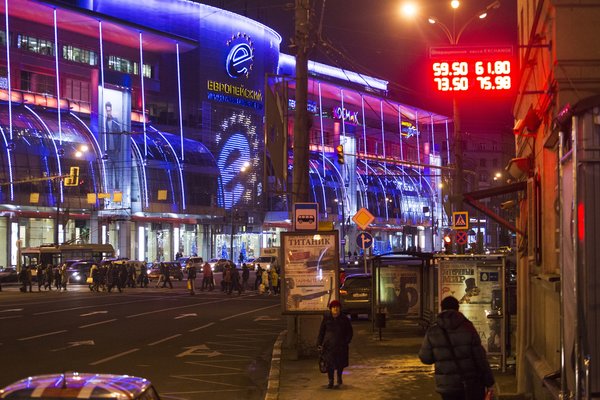(单词翻译:单击)
MOSCOW — Russia has a new enemy: the currency markets.
莫斯科——俄罗斯的敌人又多了一个:货币市场。
Russia’s government is in the middle of an all-out fight to preserve the value of the ruble in the face of plummeting oil prices and Western sanctions over the Ukraine crisis. In the boldest move yet to stanch the bleeding, the Central Bank of Russia announced a stunning interest rate increase in the middle of the night.
面临石油价格跳水和乌克兰危机引发的西方制裁,俄罗斯政府使出了浑身解数,意图力保卢布。为了阻止卢布大贬值,俄罗斯中央银行连夜采取了一个最大胆的措施,宣布大幅上调利率。

Its main deposit rate is now 17 percent, up from 10.5 percent when Russian banks closed for business on Monday. The rate increase, one of the largest ever announced by the central bank, echoes the drastic measures taken during the 1998 crisis when Russia defaulted on its debt and devalued the ruble.
俄罗斯现在的存款利率是17%,周一俄罗斯银行下班前,利率还是10.5%。上调利率的做法令人想起1998年危机时俄罗斯债务违约和卢布贬值后采取的激进措施。
The question is whether the move — announced on the central bank’s website at 1 a.m. in Russia — will appease the markets. If it doesn’t, investors may view the rate increase as a sign of increasing disarray.
这个决定由俄罗斯央行凌晨1点在其网站上宣布。问题是,此举是否将安抚市场?如果不能,投资者可能会视利率上调为形势恶化的信号。
Some economists are concerned that Russia is now stuck in the quagmire of stagflation, or high inflation and low growth. The government expects inflation of 10 percent or more by the end of this year and for the country to fall into a recession next year.
一些经济学家担心,俄罗斯可能陷入了滞胀的泥潭,高通胀与低增长并存。政府预期截至年底,通胀将达10%或更高,明年经济可能陷入衰退。
In a worrying sign, Russians have been buying up big-ticket items as the ruble depreciates, converting savings into consumer goods lest their savings become worthless. Appliance stores in Moscow have seen runs on refrigerators, washing machines and televisions.
有一个令人担忧的信号,随着卢布贬值,俄罗斯人已经在抢购耐用商品,把积蓄转化为消费品,以免存款变得一文不值。莫斯科的家电商场已经出现了冰箱、洗衣机和电视的抢购风。
The strategy behind the rate increase is straightforward. The central bank, led by Elvira Nabiullina, is hoping that the large rate increase will encourage Russian individuals, companies and banks to hold savings in rubles, rather than moving them into dollars. It is also aimed at helping to help keep inflation in check.
这次利率上调的战略很清楚。纳比乌里娜(Elvira Nabiullina)领导的俄罗斯央行希望大幅上调利率会鼓励俄罗斯个人、公司和银行继续持有卢布存款,而不是转向美元。同时这也是为了控制通胀。
“This decision is aimed at limiting substantially increased ruble depreciation risks and inflation risk,” the central bank said in its statement.
央行在声明中说:“这个决定是为了限制大幅增加的卢布贬值风险和通胀风险。”
But the surprise rate increase also underscores the limited options for Russian policy makers. The central bank has spent at least $75 billion this year to prop up the ruble, with little effect.
但这次突然加息也显示了俄罗斯决策者手上可用方案是多么有限。央行今年花了至少750亿美元力挺卢布,但收效甚微。
The ruble plummeted yet again on Monday, by more than 10 percent, to about 64 per dollar. The ruble has lost nearly half its value since the start of 2014.
周一,卢布再次贬值,幅度超10%,达到了64卢布兑1美元。2014年初至今,卢布贬值了近一半。
Aleksei L. Kudrin, a former Russian finance minister who is widely credited with having steered Russia through the 2008 financial crisis by persuading President Vladimir V. Putin to strengthen sovereign reserves, said that uneven policy making was adding to the erosion of confidence. “The fall of the ruble and the stock market is not only a reaction to lower oil prices and sanctions, but also distrust in the government’s economic measures,” Mr. Kudrin posted on Twitter.
俄罗斯前财政部长阿里克塞·库德林(Aleksei L. Kudrin)被广泛认为是帮助俄罗斯度过2008年金融危机的功臣,曾说服普京加强主权储备。他说,不平衡决策加剧了信心的流失。他在Twitter上写道:“卢布贬值股市下跌不只是对石油价格下跌和制裁做出的反应,也体现了对政府经济措施的不信任。”
The central bank is in a difficult position. The hope is that by stabilizing the value of the currency, the interest rate increase will reduce the sense of financial panic and rapid outflows of money. Russians have pulled more than $100 billion in capital from the country this year.
央行的处境很困难。它希望通过稳定货币降低金融恐慌和减少货币外逃。今年,俄罗斯已经有1000亿美元以上的资本外逃。
But the increase could also choke off growth in a Russian economy already reeling from falling oil prices. Oil and natural gas make up about 60 percent of Russia’s export earnings.
但加息也可能扼制增长。俄罗斯经济已经因油价下跌受挫,而石油和天然气构成了俄罗斯出口所得的60%。
Earlier Monday, the Russian central bank said it expected the country’s economy to contract 4.5 percent in 2015 if oil prices averaged $60 a barrel. Oil is now hovering around that level.
周一早间,俄罗斯央行宣布,如果油价跌至平均60美元一桶,预计本国经济在2015年将衰退4.5%。目前油价已经跌至该水平阶段。
The central bank had been striving to keep rates low to bolster business activity and growth. It shifted to raising rates only last spring after the Ukraine crisis put additional pressure on the ruble.
俄罗斯央行此前一直努力压低利率以刺激商业活动和经济增长。直到上个春季乌克兰危机让卢布经受更多压力后,央行才转而提高利率。
Since then, the central bank has steadily increased rates in relatively small increments. Just last Thursday, it increased rates to 10.5 percent, from 9.5 percent.
自那时起,俄罗斯央行就在逐渐地小规模加息。上周四,它又宣布将利率从9.5%提高到10.5%。
The dead-of-night action seemed to catch even seasoned market watchers by surprise. Russian news agencies close to the government described it in unusually breathless terms.
这次半夜宣布降息甚至让一些经验丰富的市场观察者都吃了一惊。接近政府的俄罗斯新闻媒体播报这条新闻时,语气都是格外少见的急促。
Noting the “rapid collapse of the ruble,” the Interfax news agency declared that the central bank had gone to “emergency measures, leaving far behind the most radical assumptions of analysts.”
提及“卢布的迅速崩溃时”,俄罗斯国际文传电讯社(Interfax news agency)称央行已经开始采用“紧急措施,分析师们此前甚至最激进的论断都已被远远超过。”
Analysts said that the rate increase might be a last-ditch move by the Russian government to try to contain the drop in the currency without adopting controls on the flow of capital or other more extensive measures to keep money in the country.
分析师认为,加息可能是政府在不采取控制措施阻止资本外流或动用其他把钱留在国内的大举措的情况下,推出的挽救货币贬值的最后一招。
“If today’s measures fail to stem the ruble rout, there is a high probability that policy will veer in a more unorthodox direction,” said Alexander Kliment, an analyst at the Eurasia Group, in a research note. “Some top advisers to Putin are openly hostile to rate hikes.”
“如果今天的措施还不能阻止卢布崩盘,政策非常可能会转到一个非常规的方向,”欧亚集团(Eurasia Group)分析师亚历山大·克里门特在一份研究简报中说。“一些普京的高级顾问已经公开反对利率飙升。”


